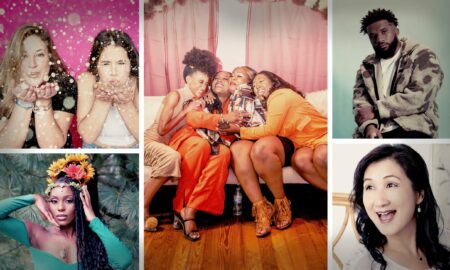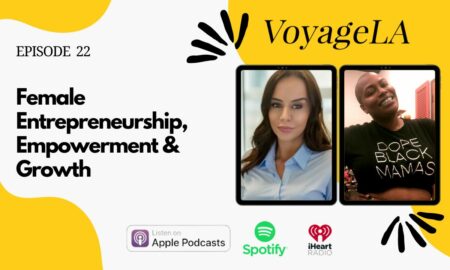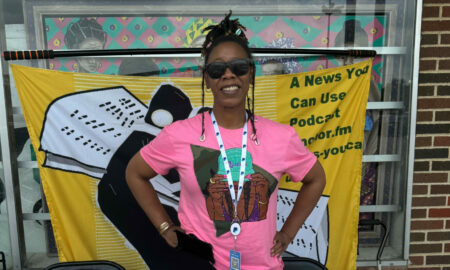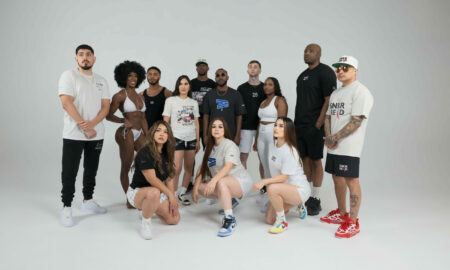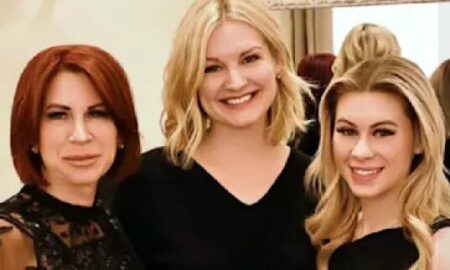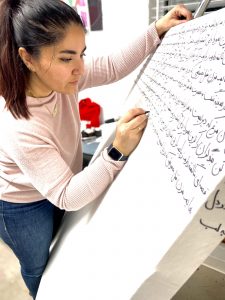
Today we’d like to introduce you to Katayoun Bahrami.
Thanks for sharing your story with us Katayoun. So, let’s start at the beginning and we can move on from there.
I am from Tehran, Iran, and I lived there until I moved to the US in 2014. When I was growing up, I was introduced to art by my parents, who have always had a passion for that. My childhood was filled with moments where I was busy with different kinds of craft making with my mom and practice calligraphy with my dad. Art has always been my interest until it became serious when I decided to change my major to Fine Arts in college. I graduated with my bachelor’s in fine arts in Iran.
After graduating, I worked in different companies as a designer and some positions with no relation to art. But I have always stuck to it and had multiple art exhibitions in Tehran. After moving to the US, I received my master’s in Arts and Cultural Management, Museum Studies from Michigan State University, in 2017. After graduating, I moved to California and started working at The Broad Museum in Los Angeles for almost a year before I move to Texas to attend the University of North Texas. I am currently in my second year of graduate school in pursuit of my Master of Fine Arts in fibers.
Great, so let’s dig a little deeper into the story – has it been an easy path overall and if not, what were the challenges you’ve had to overcome?
Honestly, it has always been very challenging. It is not easy for people to leave their home country and move to a new place to start over again, and I am not an exception. Although challenges enable a person to do things that may be uncomfortable but help them learn new skills, adopting new habits, and experiencing new things, which I love this aspect of that a lot. The challenges I want to mention are complete of another type. I was born and raised in Iran, a great and beautiful country in the Middle East. Unfortunately, the suppressive laws put so many restrictions on peoples’ day to day life. For example, suppressive laws against women caused women could not have their basic rights, such as the right to choose their outfit.
Also, these rules have prevented many talents from flourishing. It doesn’t mean that I don’t love my country or people who still live there are not happy. It means as mankind you are free to choose. You can choose what you want to say, what you want to wear, or what you want to listen to, and if you can’t, it means the very basic human rights have been taken away from you. Now I am here in the US a free country, but still, I have to face new challenges. Challenges such as the travel ban, cultural differences, and sanctions consequences, to name a few. As a student from Iran, I need to convince others that whatever they see in the media, such as FOX, is not true. Specifically, the difference between Iranian people and the government. In addition, students in the U.S. on F-1 visas always have to deal with a very challenging life. For instance, the most recently issued guidance by the Department of Homeland Security on July 6th caused a very uncertain situation for students. I couldn’t believe my eyes when I first read it in the news. This rule interrupts the study of international students unless they attend an institution that is still offering in-person instruction in fall 2020. It means we have to risk our lives and go to university even if we are at a higher risk of contracting the virus.
We’d love to hear more about your art.
My research activities work at the intersections of boundaries, identity, and women. Living in two distinctive places, and the challenges has raised many questions centered around the philosophy of boundaries and how to cope with the limitations. Finding myself surrounded by a new language, rules, culture, and people is an obstacle specifically, due to the travel ban, social media is the only way I could contact my family. In my work, I direct attention to the voices that have been taken away from women and females who are not heard because of the restriction they have. It is an emphasis on the significant amount of effort that a woman needs to have to overcome the dilemmas compare to a man because of not having equal rights in which men have the power in hand.
My work critically and intentionally is the experience of living between two distinctive places, and the role of giving a voice to females who have not been heard. Farsi handwriting encompasses most of my art. I use poems by Forugh Farokhzad, an Iranian feminist poet. In my art, I present a woman who does not want to be silent. She has the words to talk about freedom, which are regulated. I believe no matter what language the text is printed in, it interacts with the viewers and conveys the message to them.
Do you look back particularly fondly on any memories from childhood?
Like other children, my favorite memory from childhood is the time we spent at grandma’s house. Especially, the summertime at my grandparents’ lake house. The beautiful place with the eye-catching nature all together with cousins. I still view that ‘space’ as an important comparative zone. I used this idea in my recent photography project, which focuses on the emotional feeling that occurs in both locations in Iran and the place I reside now. It is like living in the realm of nostalgia mentally to the point of this reminiscence and this hope of return. The ultimate heartbreaking emotional feeling for me is the time I lost my dear grandmother, but I wasn’t able to go and visit her when she was sick because of the travel ban situation.
Contact Info:








Suggest a story: VoyageDallas is built on recommendations from the community; it’s how we uncover hidden gems, so if you or someone you know deserves recognition please let us know here.










